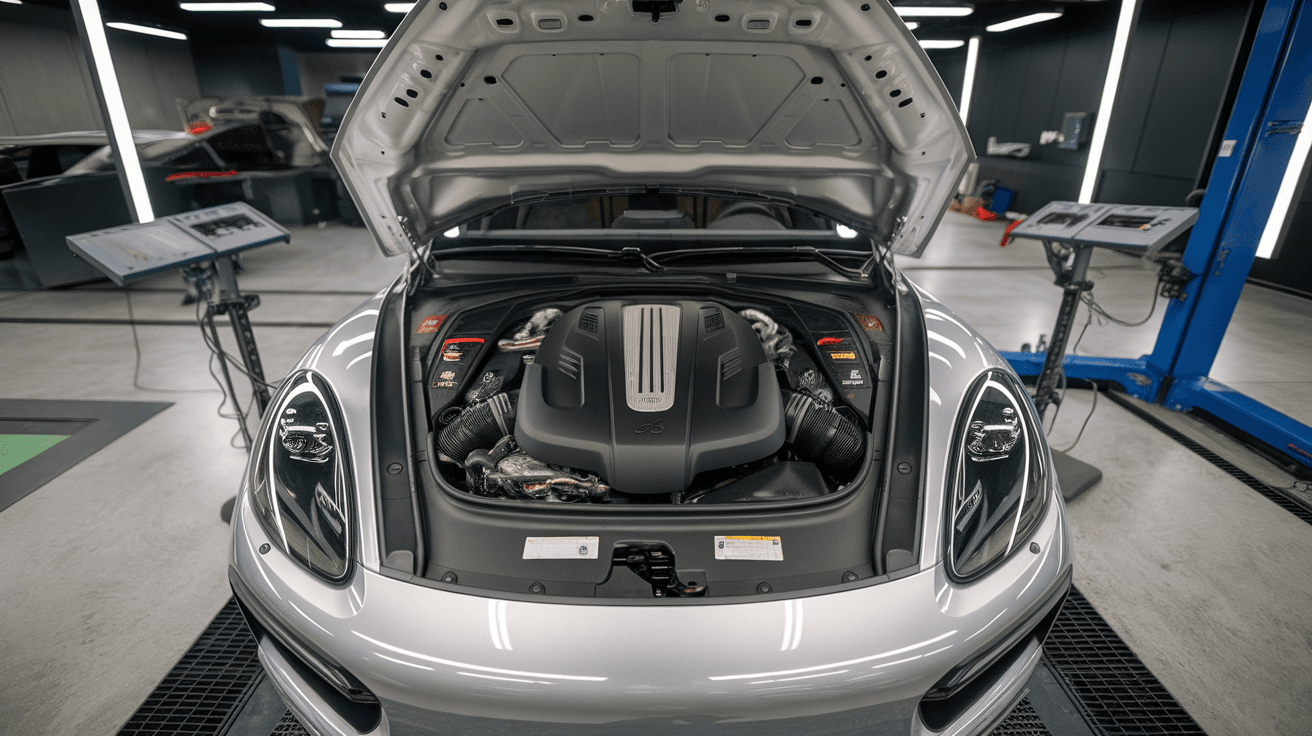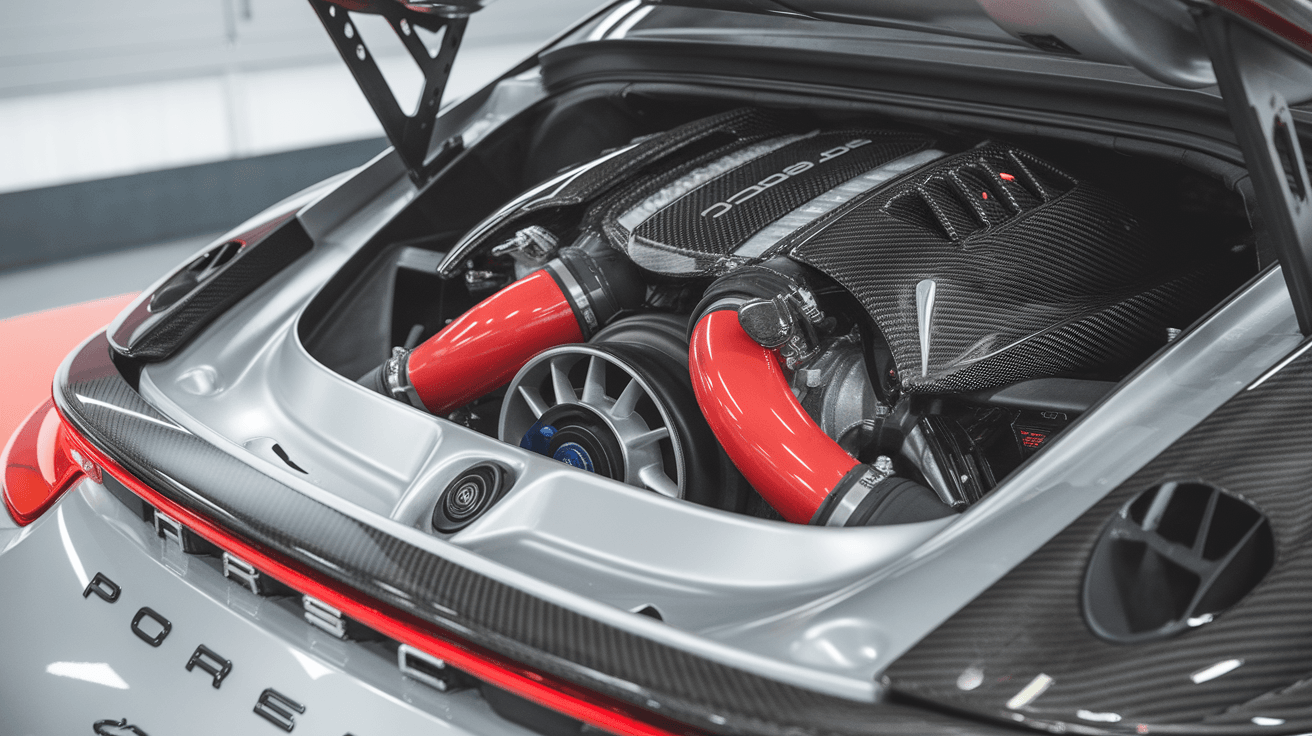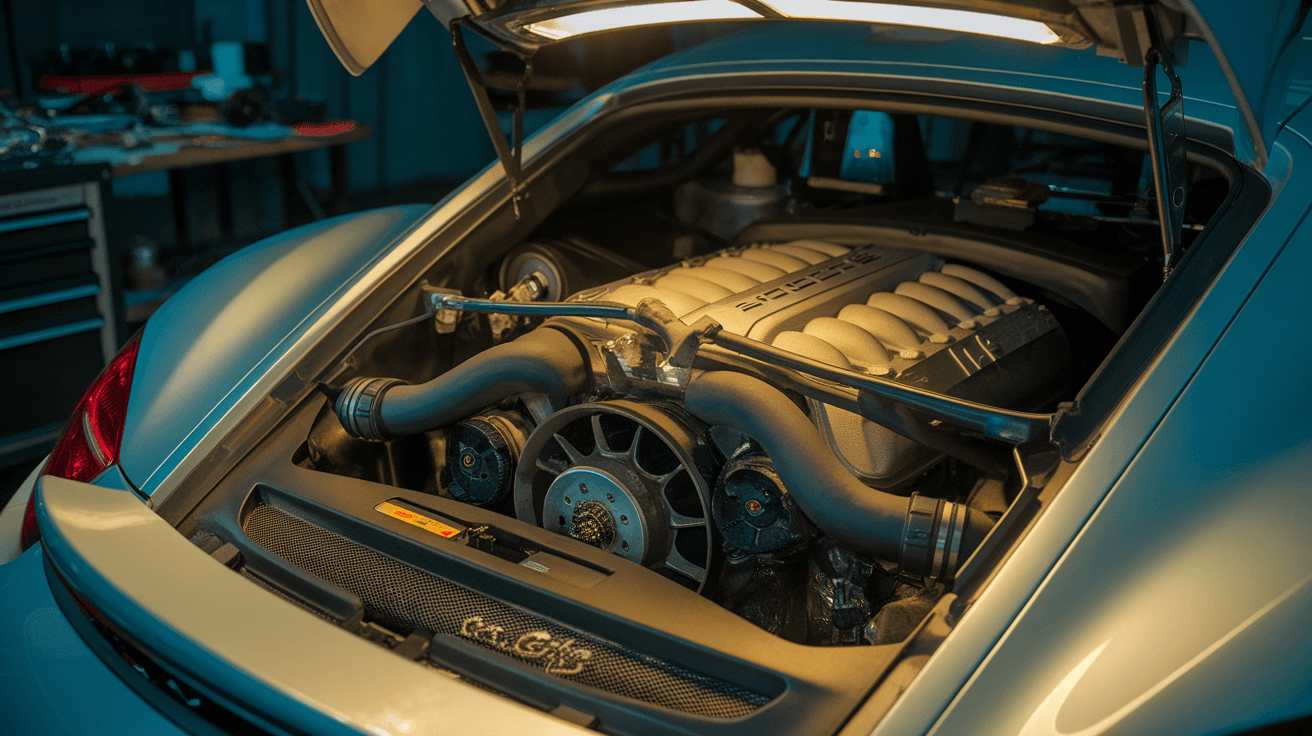Unlock the Secrets of Engine Repair & Maintenance for Porsche-Compatible Vehicles

So, you’ve got one of those high-performance German beauties lucky you! These vehicles are some of the most well-engineered machines on the road. But even the finest models need a little TLC from time to time, right? You probably don’t want to drop thousands on surprise engine repairs, but let’s be honest it can feel like your car is hiding a secret… until one day, it decides to speak up. Engine repair and maintenance for vehicles designed for Porsche drivers is key to keeping your ride smooth, strong, and free from those dreaded “uh-oh” moments. But how do you make sure you’re doing it right before things go sideways under the hood?
Why German Car Engine Repair Matters | Keeping It Running Smooth
Have you ever noticed your Car not quite running the way it used to? You know, sluggish starts, or that odd grinding sound when you hit the gas pedal? These aren’t just annoying quirks, they could be signs that your engine is trying to tell you something. Here’s the thing: keeping your German Car engine repair and maintenance in check isn’t just about saving money; it’s about enjoying that smooth, powerful ride Porsche is known for.
Common Engine Issues in Porsches Vehicle
Oil Leaks
You’ve probably heard it a million times, but oil leaks in Porsches are more common than you think. Whether it’s a worn-out gasket or a seal giving up, even a small leak can lead to big problems. The worst part? You might not even know it’s happening until the car engine is already in trouble.
Solution: Regular inspections are key. Keep an eye on oil levels and get those seals checked out before they become major leaks. A small issue caught early is way cheaper than a major engine overhaul later.
Overheating
Okay, picture this: You’re cruising down the road, and suddenly, that temperature gauge starts creeping up. No one wants to be stranded on the side of the road because the engine overheated, right? It happens when your cooling system is compromised, which is often the case in older models or those lacking regular engine repair.
Solution: Make sure to replace your coolant and flush the system on time to avoid an overheating disaster. Don’t ignore that temperature gauge, it’s giving you a hint that could save you a major headache.
Carbon Buildup
Here’s something that sneaks up on you, carbon buildup on the intake valves. This can cause a range of issues, from misfires to rough idling. And don’t even get me started on the hit to performance. If you want that engine repair of porsche vehicle bill to stay low, carbon buildup is one thing you definitely don’t want to ignore.
Solution: Regular maintenance like walnut blasting can clean up carbon buildup, keeping your engine running smoothly and saving you from a costly engine clean-up later. It’s one of those “do it now, thank me later” things. And if your dash has thrown an electrical alert recently, our explainer “ Battery Warning Light | Causes & Immediate Action” shows what it means and what to do next.
Taking care of your German car engine isn’t just about avoiding those annoying repair bills; it’s about maintaining that powerful, smooth ride we all love. A little maintenance here and there can make a world of difference, and trust me, it’s worth the effort. Stay on top of things with timely car engine repair and your Porsche will thank you for it.
Car Engine Repair Maintenance | The Basics You Can’t Skip
When was the last time you checked the oil in your Porsche Vehicle? It might sound like a no-brainer, but engine oil, filters, and other basic maintenance tasks are easily overlooked. And let’s be honest, we all want our Porsche engines to last forever, right? But that’s not going to happen if we skip the small stuff.

Essential Porsche Engine Repair & Maintenance
Oil & Filter Changes
Think of oil as the lifeblood of your Car engine repair. Without fresh, clean oil, things start to wear out. Simple as that.
- How Often? Typically, every 10,000 miles, but if you’re in hotter climates like Dubai, maybe a little more frequently.
- Why? Clean oil keeps the engine components well-lubed and prevents overheating. Regular
engine maintenance helps your engine run like a dream without any hiccups.
Spark Plugs Replacement
Firing up your Porsche should feel smooth, and spark plugs are a big part of that. Over time, they wear out and need to be replaced to maintain that crisp acceleration and fuel efficiency.
- How Often? Every 30,000 miles or as recommended by your Porsche model.
- Why? Bad spark plugs lead to misfires, poor engine performance, and fuel waste. Regular spark plug replacement is key to Porsche engine repair and keeping everything running smoothly.
Air Filters & Cabin Filters
Your engine needs clean air to breathe, and so does your cabin. A clogged air filter can decrease engine power, and a dirty cabin filter will leave you breathing less-than-ideal air quality.
- How Often? Replace air filters every 15,000 to 20,000 miles; cabin filters every year.
- Why? Clean filters help the engine run efficiently and keep you comfortable inside. A small but vital part of car engine repair that ensures smooth performance and a pleasant ride.
Coolant Flush
The cooling system is what keeps your Car’s engine repair from overheating, so don’t neglect it. Flushing the system ensures everything runs smoothly and prevents the dreaded overheating problem.
- How Often? Every 2-4 years, depending on your model.
- Why? Prevents corrosion and ensures the cooling system is performing at its best. Without regular Porsche Vehicle engine maintenance, you could be risking a big repair bill down the road.
Think of these basic maintenance steps as a small investment in the long-term health of your German car engine repair. It’s all about keeping things running smoothly and efficiently, so you can keep enjoying that power and performance. Simple stuff, but it goes a long way in protecting your Porsche engine.
Car Engine Repair Diagnostics | Spotting Problems Before They Escalate
Ever wonder what’s really going on under the hood of your Porsche? You know, those weird noises and performance hiccups that make you raise an eyebrow? With the right diagnostics, you can catch those issues early and save yourself from massive Porsche engine repair bills later on. If your car cranks but won’t fire or shows intermittent starting drama, don’t miss our guide “Why is My Porsche Vehicle Not Starting? 2025 Updated” for step-by-step causes and quick checks. Here’s how!
Key Diagnostic Tools & Tests
OBD-II Scanners
These little gadgets are like a doctor’s stethoscope for your Car engine repair. They can pull codes directly from your car’s computer, giving you a glimpse of what’s happening inside.
- Why It’s Important? Fast, reliable, and can pinpoint issues like sensor failures or misfires.
- How to Use? It’s easy, just plug it into your Porsche’s OBD-II port, and let it run the scan. That’s it, simple and effective for identifying issues before they snowball.
Compression Testing
Compression testing tells you how well your Car engine is sealing. If there’s low compression in a cylinder, that’s a red flag for engine trouble.
- Why It’s Important? Identifies internal engine repair issues early, saving you from big repairs down the road.
- How to Do It? It requires a compression gauge and a little know-how, but it’s worth it to understand the health of your engine. It’s the best way to catch early signs of engine wear before they become a full-blown issue.
Visual Inspection
Sometimes, you just need a good old-fashioned eyeball test. Look for leaks, cracked hoses, or worn-out belts.
- Why It’s Important? The sooner you spot an issue, the sooner it can be fixed, avoiding bigger German car engine repair problems later.
- How to Do It? Check under the hood every few months for signs of wear, leaks, or damage. A quick visual inspection can prevent minor issues from becoming expensive repairs.
Spotting issues early can save you a ton of money in the long run. With the right diagnostics, you’ll know what’s going on with your engine repair and can nip problems in the bud before they get out of hand. It’s all about keeping your ride healthy and strong, because a healthy Porsche engine is a happy Porsche owner. Ready for expert Porsche diagnostics and maintenance in Dubai? Visit our Speciallized German car garage to book advanced scans, OEM-grade repairs, and preventive service tailored to your model.
When to Consider a Porsche Vehicle Engine Repair Rebuild | Know the Signs
Ever thought about getting an engine rebuild for your Porsche model ? It’s not the most fun thing to think about, but sometimes it’s the best way to restore your car engine repair to its former glory. But how do you know when it’s time? Let’s break it down.

Signs You Might Need a Engine Rebuild
High Mileage on the Engine
If your German car engine is pushing 150,000 miles or more, it might be time to think about a Porsche Vehicle engine repair or rebuild.
- Why It’s Important? High mileage leads to wear and tear that could affect performance. Rebuilding can restore that smooth ride you fell in love with.
- What to Look For? Loss of power, excessive oil consumption, or constant overheating could be signs it’s time for a engine repair or rebuild.
Loss of Power or Sluggish Acceleration
If your Porsche engine feels like it’s running out of steam, it could be an engine performance issue. A rebuild might be needed to restore lost power.
- Why It’s Important? A sluggish engine means something is seriously wrong under the hood. engine repair might fix it, but in some cases, a full rebuild is necessary to bring it back to life.
- What to Do? Get a compression test to check for internal issues like worn-out pistons or valve seals.
Excessive Oil Consumption
If you find yourself topping up the oil every few weeks, your Car engine repair might be needed. It could be a sign of worn-out seals or rings.
- Why It’s Important? Burning oil can damage your Porsche engine further if left unchecked. A rebuild might be necessary to fix the issue and avoid further damage.
- What to Look For? Smoking exhaust or dropping oil levels are classic signs of excessive oil consumption. If you’re noticing this, it’s time to have a professional look at your engine repair.
An engine rebuild might sound like a daunting task, but it’s often the best way to bring your Porsche Vehicle engine repair back to its prime. If you’re noticing the signs, high mileage, loss of power, or burning oil, don’t wait too long to get things checked out. A rebuild could be the fix your German car engine needs to get back on the road running like new.
Prolonging Engine Repair Life | Expert Tips
What if I told you there’s a way to keep your Porsche running smoothly for years? Well, it’s true! Prolonging your engine repair needs isn’t just about fixing problems as they pop up, it’s about treating it right from the start. Let’s dive into some expert tips that’ll keep your engine healthy and happy for the long haul.
Top Tips to Extend Engine Life
Stick to Regular Maintenance | Your Key to Preventing Car Engine Repair
Regular oil changes, spark plug replacements, and air filter changes are essential.
- Why It’s Important? Small maintenance tasks go a long way in preventing bigger problems and costly Porsche engine repairs down the road.
- How to Do It? Follow Porsche’s recommended service schedule for your model. Don’t skip out on those maintenance milestones, it’s an investment in your engine repair future.
Drive Responsibly | Reduce Your Need for Porsche Engine Repair
Your driving habits have a huge impact on your engine repair needs. Avoid hard starts, rapid acceleration, and unnecessary idling.
- Why It’s Important? Gentle driving reduces engine strain, allowing it to last longer and saving you from unexpected Porsche engine repair bills.
- What to Do? Ease off the gas pedal, especially when the engine is cold. Give it some time to warm up, and your Porsche engine will thank you for it.
Use OEM Parts | Keep Your Car Engine Repair at Its Best
Aftermarket parts might be cheaper, but they can affect your engine’s performance. Stick with original parts whenever possible.
- Why It’s Important? OEM parts are designed to work perfectly with your Porsche Vehicle engine, ensuring peak performance and reducing the likelihood of costly repairs.
- What to Do? Always ask for original Porsche parts when getting a engine repair or replacement. It’ll ensure that your Porsche stays as good as new, or even better.
Proper Storage | Protect Your German car Engine from Damage
If you’re storing your Porsche for a while, make sure it’s in a climate-controlled garage and covered properly.
- Why It’s Important? Extreme temperatures and humidity can wreak havoc on engine parts, leading to costly Porsche engine repair work when you take it out of storage.
- What to Do? Store your Porsche in a dry, cool place with proper maintenance before and after storage. Trust me, your Porsche engine repair bill will be much lower if you store it right.
Prolonging your engine repair needs is all about staying on top of regular maintenance, driving carefully, and using high-quality parts. Follow these expert tips, and you’ll be able to enjoy your Porsche engine performance for years to come. Treat it right, and it’ll treat you right. 😎 Keep your engine healthy, and you won’t be dealing with those major repairs anytime soon.

FAQs |Car Engine Repair and Maintenance
Q1: How often should I change the oil in my German car engine?
It’s recommended to change your oil every 10,000 miles or once a year, depending on your driving habits and the model. Always use high-quality oil for your Porsche Vehicle engine repair to ensure longevity and smooth performance.
Q2: Why does my Porsche Vehicle engine overheat?
Overheating can happen due to coolant system failures or low coolant levels. Always check your coolant and schedule regular engine repair and maintenance to prevent this issue from turning into a major problem.
Q3: Can I drive my Porsche vehicle if the engine is making a strange noise?
If you hear grinding or knocking noises, it’s best to stop and have it checked immediately to prevent further damage. Getting a engine repair early can save you from more costly fixes down the road.
